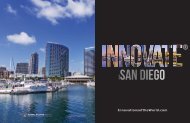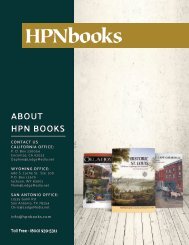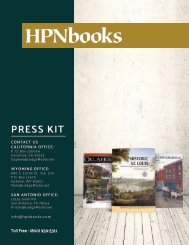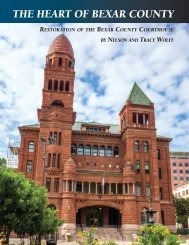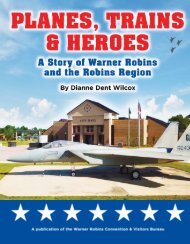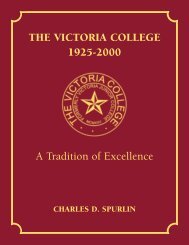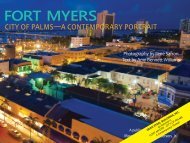In The Cradle of Industry and Liberty
An illustrated history of Philadelphia's manufacturing sector paired with the histories of local companies that make the city great.
An illustrated history of Philadelphia's manufacturing sector paired with the histories of local companies that make the city great.
Create successful ePaper yourself
Turn your PDF publications into a flip-book with our unique Google optimized e-Paper software.
EHMKE<br />
MANUFACTURING<br />
COMPANY<br />
@<br />
Above: Howard Jonathan Ehmke.<br />
Top: Howard Ehmke, lower left, founded<br />
Howard Ehmke Manufacturing Company<br />
following a record-setting win in Game 1 <strong>of</strong><br />
the 1929 World Series. <strong>The</strong> first product<br />
manufactured was a tarp for Philadelphia’s<br />
Shibe Park.<br />
Right: Left to right, Ehmke Manufacturing<br />
Company Chief Executive Officer Robert L.<br />
“Bob” Rosania <strong>and</strong> Chief Operating Officer<br />
S. Clifford Stokes have ensured the future <strong>of</strong><br />
the diversified textile company through their<br />
commitment <strong>and</strong> innovation.<br />
Opposite, top: <strong>In</strong> 2015, Ehmke<br />
Manufacturing Company employed more<br />
than 140 men <strong>and</strong> women, with sales<br />
exceeding $12 million.<br />
Opposite, middle: Ehmke Manufacturing<br />
Company has been awarded some <strong>of</strong><br />
the government’s largest contracts to<br />
manufacture products for the military<br />
such as High Ground Tactical Gear Items.<br />
Opposite, bottom: <strong>The</strong> insulation blankets<br />
inside <strong>of</strong> a CH-46 U.S. Department <strong>of</strong><br />
State Helicopter.<br />
<strong>In</strong> 1929, Howard Jonathan<br />
Ehmke won Game 1 <strong>of</strong> the<br />
World Series for the Philadelphia<br />
Athletics over the Chicago Cubs<br />
with thirteen strikeouts—a record<br />
that lasted twenty-five years. That<br />
same year, he founded Howard<br />
Ehmke Manufacturing Company<br />
to manufacture athletic field<br />
covers for athletic stadiums.<br />
Ehmke, born <strong>and</strong> raised in<br />
Silver Creek, New York, had<br />
arrived in Philadelphia to play for<br />
legendary manager Connie Mack <strong>of</strong> the<br />
Philadelphia Athletics. And, immediately following<br />
that historic Game 1, he decided to<br />
make Philadelphia his home. Known for its<br />
highly-skilled textile workers <strong>and</strong> fabric<br />
industry, it was the perfect location to begin<br />
production <strong>of</strong> covers to protect athletic fields.<br />
From his experience on the mound,<br />
Ehmke knew the deteriorating conditions rain<br />
had on the infield. During inclement weather<br />
most fields were left uncovered, while smaller<br />
tarps pieced together loosely covered others.<br />
He began developing a process to create<br />
oversized, one-piece covers.<br />
<strong>The</strong> result came in the form <strong>of</strong> a trench—<br />
a thirty-six inch trench the width <strong>of</strong> the<br />
building in the floor <strong>of</strong> the warehouse. <strong>In</strong> the<br />
bottom <strong>of</strong> the trench Ehmke placed a single,<br />
railroad rail <strong>and</strong> mounted a sewing machine<br />
with a fitted wheel to it. <strong>The</strong> sewing machine,<br />
mounted even with the floor, would be<br />
ridden along the track to bind the edges <strong>of</strong><br />
the fabric. This allowed the huge textiles to<br />
be sewn without having to pull the cumbersome<br />
fabric up onto a sewing machine table.<br />
<strong>The</strong> company’s first infield tarp was manufactured<br />
for Shibe Park in north Philadelphia<br />
at Twenty-First Street <strong>and</strong> Lehigh Avenue,<br />
located directly across the street from the<br />
Howard Ehmke Manufacturing Company. Later<br />
renamed Connie Mack Stadium, during its<br />
existence from 1909 to 1970 the park was<br />
home to the Philadelphia Athletics, Philadelphia<br />
Phillies, <strong>and</strong> the NFL’s Philadelphia Eagles.<br />
Visiting teams took notice <strong>of</strong> the infield<br />
coverings <strong>and</strong> business grew. By the 1940s,<br />
Howard Ehmke Manufacturing Company<br />
athletic coverings were being used in college<br />
<strong>and</strong> pr<strong>of</strong>essional baseball <strong>and</strong> football stadiums<br />
throughout the United States. <strong>In</strong> addition,<br />
the company had ventured into producing<br />
canopies <strong>and</strong> awnings. During the Great<br />
Depression, while other companies were<br />
folding, Ehmke persevered by staying true<br />
to his core business <strong>and</strong> not employing more<br />
than a few people.<br />
Following a brief illness, Ehmke died in<br />
early 1959. Within a month, the company was<br />
sold to Louis S. Verna <strong>and</strong> Walter E. Rowe.<br />
Verna <strong>and</strong> Rowe were forced to reduce the<br />
workforce <strong>and</strong> decreased their own salaries to<br />
free up capital.<br />
New industries were added to the customer<br />
base <strong>and</strong> the 1960s welcomed updated<br />
equipment <strong>and</strong> a larger plant at Wister <strong>and</strong><br />
Barfield Avenues. <strong>The</strong> company was incorporated<br />
as Ehmke Manufacturing Company, <strong>In</strong>c.<br />
<strong>The</strong> awning <strong>and</strong> canopy share <strong>of</strong> the business<br />
IN THE CRADLE OF INDUSTRY AND LIBERTY<br />
136




